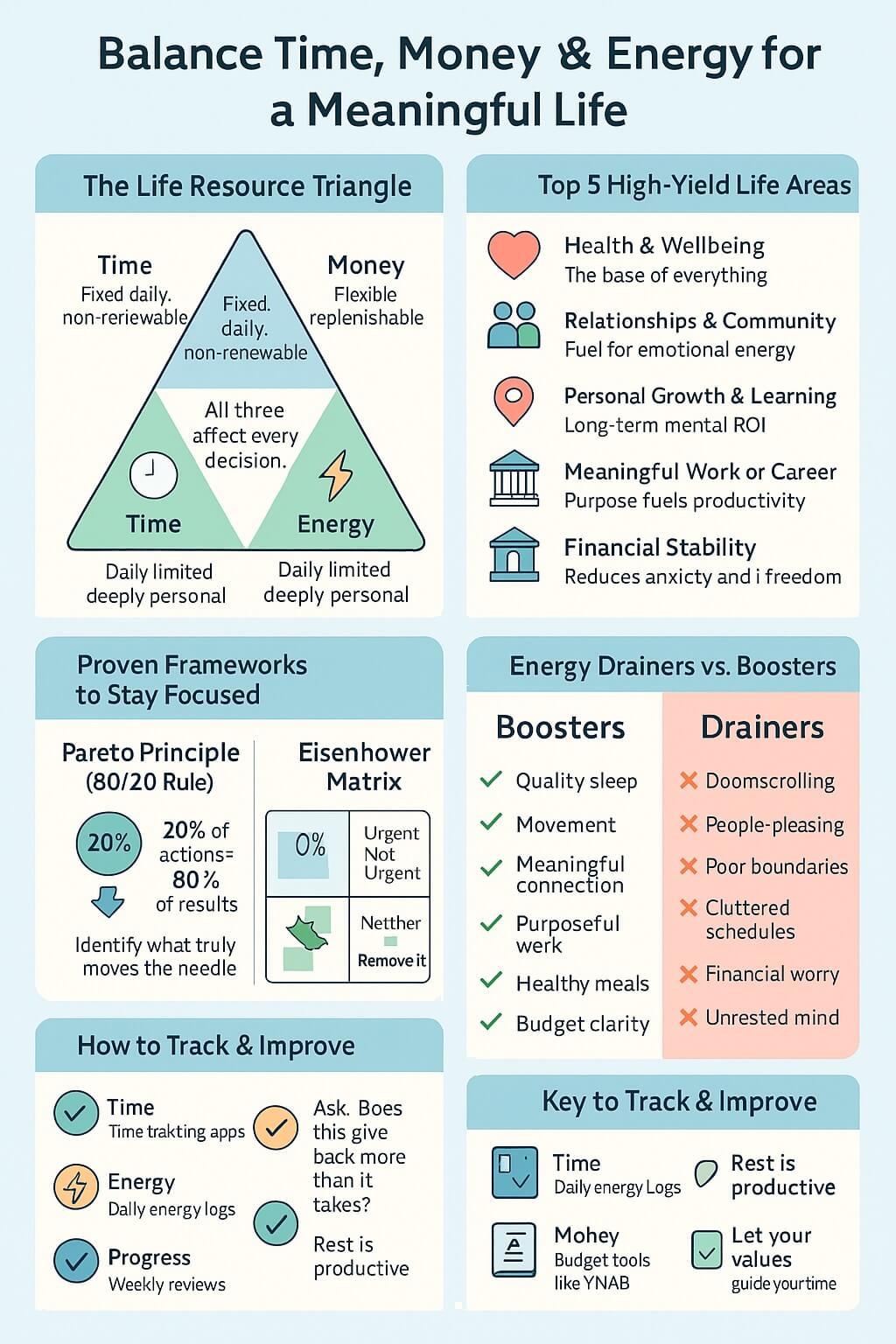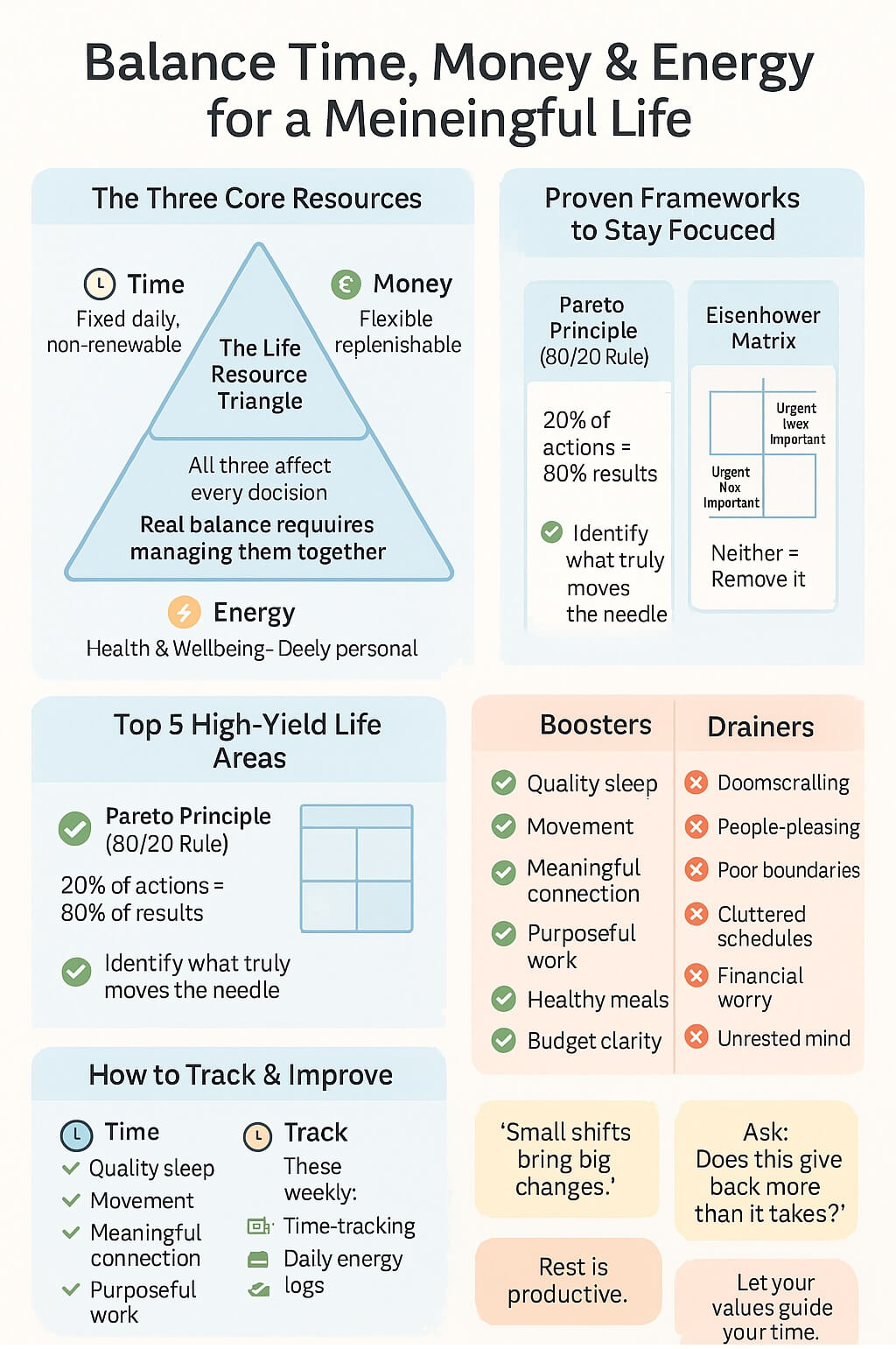
You Can’t Pour from an Empty Cup: Why This Topic Matters
We all have the same number of hours in a day. Yet, some people seem to make progress easily, while others stay stuck despite working harder. You're not alone if you’ve ever felt drained, broke, or like time slips away. That tension often comes from misaligning your three most valuable resources: time, money, and energy.
This guide offers a practical approach to refocusing limited resources into areas that yield the most value. We're talking about health, growth, meaningful work, and relationships—the kinds of investments that pay off in ways you can feel daily.
Table of Content
- You Can’t Pour from an Empty Cup: Why This Topic Matters
- What Are High-Yield Areas in Life?
- Understanding the Triangle of Resources
- How to Know Where You Stand Right Now
- Health and Wellbeing: The Non-Negotiable Foundation
- Relationships and Community: The Happiness Engine
- Personal Growth and Learning: Fuel for the Mind
- Purposeful Work: Align Your Career with What Matters
- Money: Make It a Tool, Not a Trap
- Use the 80/20 Rule to Work Smarter
- The Eisenhower Matrix: Prioritize What Matters
- Watch Out for These Signs of Burnout
- How to Reallocate Wisely
- Real-Life Shifts: Small Tweaks, Big Change
- What Experts Recommend
- Tracking Tools That Keep You Honest
- Avoid These Common Mistakes
- Key Takeaways
- Conclusion: Choose What Gives Back
- FAQs
What Are High-Yield Areas in Life?
High-yield areas are the parts of your life that give back more than you put in. Think of them like the dividend-paying stocks of your personal life. Invest wisely, and they’ll keep giving long after the initial effort.
The five most impactful areas include:
-
Your health (physical and mental)
-
Relationships and community
-
Personal growth and learning
-
Purposeful work or career
-
Financial stability
Focusing your limited resources on these areas can improve how you feel, function, and make daily decisions.
Understanding the Triangle of Resources
You work with three primary resources:
-
Time: Limited and non-renewable
-
Money: Flexible and replenishable
-
Energy: Daily, cyclical, and deeply affected by sleep, stress, and nutrition
If even one is off balance, the others suffer. For example, you might have money but no energy to enjoy it. Or you might have time but no money to pursue what you want. Managing these together—not separately—is key.
How to Know Where You Stand Right Now

Start by asking yourself:
-
What’s draining me the most lately—time, money, or energy?
-
What do I spend my free time on? Is it helping or hurting?
-
Do I feel tired, overworked, or financially stuck?
Keep a week-long log. Write down how you spend your time, what tasks drain or recharge you, and where your money goes. This isn't about judgment—it's about clarity.
Health and Wellbeing: The Non-Negotiable Foundation
Health is the base. Without it, nothing else works well. According to the World Health Organization, poor health is a top factor behind lost productivity and declining happiness.
What you can do:
-
Get 7–9 hours of quality sleep
-
Exercise regularly (even brisk walking counts)
-
Eat whole foods and drink enough water
-
Limit caffeine and alcohol intake
Personal tip: I used to burn the candle at both ends, thinking I was being productive. However, I ended up with burnout, insomnia, and brain fog. I felt sharper when I prioritized rest and movement, and my output improved, even with fewer working hours.
Relationships and Community: The Happiness Engine
Relationships greatly affect emotional energy. The Harvard Study of Adult Development showed that meaningful relationships are the most significant factor in long-term happiness and health.
What to try:
-
Reach out to one friend each day—even a voice message works
-
Let go of draining social ties (with grace)
-
Say yes to time with people who uplift you
These connections aren’t fluff. They’re fuel.
Personal Growth and Learning: Fuel for the Mind
Growth builds confidence and keeps your mind fresh. The returns are enormous, whether you're learning a new skill, reading daily, or joining a new group.
OECD data links continued learning with better jobs, longer life expectancy, and more adaptability during change.
You can start with:
-
Reading 10 pages of a non-fiction book daily
-
Listening to podcasts during commutes
-
Taking free online courses or joining a book club
Growth doesn’t need to cost much but will always pay off.
Purposeful Work: Align Your Career with What Matters
Most people spend more than 90,000 hours at work in their lifetime. If that time drains you instead of fueling you, there’s a cost beyond the paycheck.
The Gallup Global Workplace Report shows that nearly 85% of workers feel disengaged. Disconnection causes stress, fatigue, and even illness.
What helps:
-
Define your core values and check if your work supports them
-
Look for ways to add meaning to what you already do
-
Start a side project or explore new paths
Doing work that energizes you doesn’t have to mean quitting your job—it might just mean reshaping your role.
Money: Make It a Tool, Not a Trap
Money isn't evil—but worrying about it all the time is exhausting. Financial anxiety drains your focus and energy.
Here are ways to ease that stress:
-
Follow the 50/30/20 rule for budgeting
-
Automate savings and bills
-
Use tools like YNAB or a simple spreadsheet to track spending
-
Set small, weekly money goals
Personal story:
I used to think I needed a big salary to feel free. But tracking my money made me realize I had a spending issue, not an income one. Small habits—like meal planning—freed up hundreds each month.
Use the 80/20 Rule to Work Smarter
The Pareto Principle says 80% of your results come from 20% of your efforts. This means most of what you do might not be helping as much as you think.
Focus on:
-
What brings the most value or joy in your life?
-
Which habits give you the best return?
Cut or delegate the rest. This frees up all three resources at once.
The Eisenhower Matrix: Prioritize What Matters
This tool sorts your tasks into four categories:
-
Urgent and important (do now)
-
Important but not urgent (schedule it)
-
Urgent but not necessary (delegate it)
-
Neither (remove it)
Using this matrix helps you stop reacting and choose where your energy goes.
Watch Out for These Signs of Burnout
Burnout isn’t a mood—it’s a signal. A body’s way of saying "you’re out of fuel."
Common signs:
-
Constant fatigue or brain fog
-
Feeling emotionally flat
-
Withdrawal or irritability
-
Loss of motivation or purpose
Burnout is usually caused by prolonged imbalance. Recovery starts by rebalancing.
How to Reallocate Wisely
Here’s where you take control:
-
Drop one low-value task this week
-
Say no to requests that drain you
-
Limit screen time
-
Protect one energy peak per day for your most meaningful work
Ask yourself: “Does this task return more than it takes from me?”
Real-Life Shifts: Small Tweaks, Big Change
When I blocked mornings for my most creative work—no email, no meetings—I tripled my writing output. I also said no to some weekend gigs, choosing rest over hustle. The gains? Better income, better mood, and less mental fog.
What Experts Recommend
-
Daniel Kahneman explains how mental fatigue leads to bad decisions.
-
Tony Schwartz promotes energy management over time management.
-
James Clear shares that small, consistent habits change identity over time.
When research and real life agree, it’s worth paying attention.
Tracking Tools That Keep You Honest
Try:
-
Time tracking: Use apps like RescueTime or a bullet journal
-
Budgeting: Use an app or a notebook to see where money leaks
-
Energy log: Track what gives or drains your energy each day
-
Weekly reviews: Ask yourself what’s working and what’s not
Avoid These Common Mistakes
-
Waiting until burnout to make changes
-
Thinking you need to earn more before changing habits
-
Confusing productivity with purpose
-
Giving energy to people or tasks that don’t matter long-term
Key Takeaways
-
Time, money, and energy are limited. Use them with care.
-
Focus on what gives long-term returns: health, relationships, learning, work you care about, and financial peace.
-
Use tools like the 80/20 rule and Eisenhower Matrix to sort your priorities.
-
Small changes lead to a significant impact over time.
Conclusion: Choose What Gives Back
You don’t need a complete overhaul to feel better; you just need clarity. Start small. Pick one high-yield area and shift some time, money, or energy toward it. Then, let that build.
You might be surprised how much lighter life feels when your resources match your values.
FAQs
1. How do I know if I’m spending energy in the right place?
Check how you feel after tasks—drained or recharged? That’s your clue.
2. Can I balance all three areas at once?
Yes, but start with the one that needs the most help. Balance is built gradually.
3. What if I have no time to track everything?
Even five minutes of reflection each night can show trends and help you adjust.
4. Is money more important than time or energy?
They’re connected. But money can be earned later—time and energy can’t.
5. How do I avoid slipping back into imbalance?
Build routines that protect your time and energy. Review and adjust monthly.





